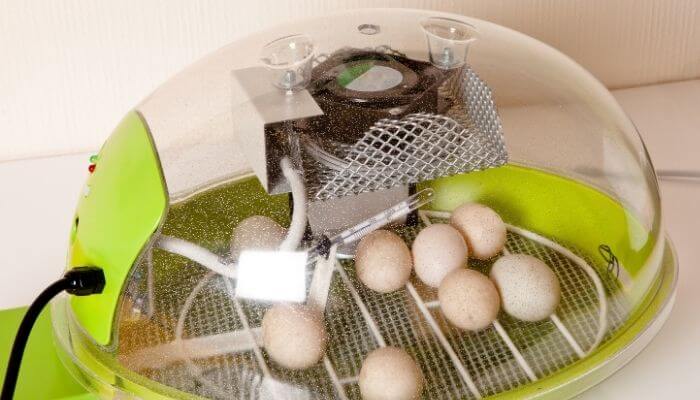This article will give you a step-by-step guide to caring for a pigeon egg if you happen to find one as well as how to work out whether or not an egg contains a live chick.
As an Amazon Associate I earn a small fee from qualifying purchases made through Amazon links. This helps us run the site – thanks for your support!
You can take care of a pigeon egg by keeping it in an incubator that is set at 37.2-37.5 Celsius and around 60% humidity for optimal development with the best chance to hatch successfully!
What To Do If You Find An Abandoned Pigeon Egg
If you find an abandoned pigeon egg first of all you need to establish if there is a live pigeon chick in the egg.
How To Work Out If There Is A Live Pigeon Chick In The Egg
There are a couple of ways you can do this:
1. Listen To The Egg
Give the egg a light tap and listen carefully for any noise. If the egg is close to hatching and there is a live chick in there you are likely to see or hear some movement.
2. Candling
The best way to work out if the egg is fertilised or if there is a live chick in a egg is by what is called candling.
To do this go into a dark room and shine a bright light at the bottom of the egg if the egg is fertilized you will see veins forming in the egg and a dark patch in the middle.
If there are no veins the egg has not been fertilised.
If the chick has died in the egg you will likely see a clear space under the air cell (at the base of the egg) and the shadow of the chick is will appear blotchy.
Call A Wildlife Authority To Take Care Of The Egg
If there is a live chick in the egg then you can call your local wildlife authority to come and take care of the egg.
They will be able to re-home or release the pigeon into their natural habitat when it is ready.
..Or Look After The Egg Yourself
If you are going to look after the egg yourself then you will need to find a safe warm place to keep it.
An incubator is the ideal solution for this.

A simple cardboard box with a heatlamp is also an option, but you will need to keep checking the temperature.
Whether you use a pigeon egg incubator or a box and heat lamp you should ensure that the temperature remains between 98.6°F and 100.4°F (37.2°C – 37.5°C for the safe development of the egg.

If you are using an incubator you should set it to around 57% humidity (give or take).
Pigeon eggs typically take 18 days to hatch once laid, so make sure to regularly check the progress of your egg, they may hatch within a day or it could be a couple of weeks or longer.
When your pigeon does hatch you need to be ready to take care of the newborn baby pigeon so don’t forget to read our article on that!

This article was written by our qualified veterinarian Cristina.
This is part of our commitment to providing you with the most trustworthy veterinary advice for your pigeons.
Is It Okay To Touch Pigeon Eggs?
It is safe to touch pigeon eggs, pigeons have a very poor sense of smell so even if the egg has only temporarily been abandoned no issues will be caused when the parent returns and smells the egg has been touched as they won’t really notice it.
The only worries you should have when it comes to touching a pigeons eggs is keeping your hands clean and trying avoid any food or liquid getting onto the shell, as this could cause bacterial growth that can kill a developing embryo inside of its protective membrane if left unchecked for too long.
How Long Can Pigeon Eggs Survive Without Incubation?
Pigeon eggs can survive as long as 5 days without incubation, and this is often long enough to allow the parent pigeon who laid it to return.
The key element that determines how long an egg will be without being incubated is the temperature.
In warmer climates they can last as long as 7 days without incubation.
In colder climates they may only last a few hours.
Use the candling method (mentioned above) to work out if the egg has survived.
Sources:
